Contents
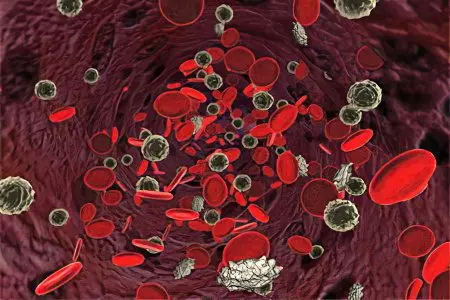
In past years, anemia caused by vitamin B12 deficiency was called pernicious anemia or pernicious anemia. For the first time, the English doctor Thomas Addison officially announced the disease. It happened back in 1855. Seventeen years later, the German scientist A. Birmer described B12 deficiency anemia in much more detail. However, the discovery of this disorder belongs to the English doctor, so B12-deficiency anemia is rightly called Addison’s disease. In some sources, you can also find the term “Addison-Birmer’s disease.”
In the 20s of the last century, a real breakthrough occurred in the treatment of this disorder. While earlier, the disease was considered incurable. The fact that you can get rid of B12-deficiency anemia was told to the world by doctors from America: George Will, William Murphy and George Minot. Moreover, for a cure, it will be necessary to eat raw liver. For their discovery in 1934, scientists received the Nobel Prize. They proved that B12 deficiency anemia develops in people whose stomach is not able to secrete substances that would help vitamin B12 be absorbed from food. In modern medicine, megaloblastic anemia, which is characterized by a lack of cyanocobalamin (the name of vitamin B12), is called B12 deficiency anemia by doctors. In addition, B12-folate deficiency anemia is distinguished, which is accompanied by a deficiency of folic acid (vitamin B9).
B12-deficiency anemia manifests itself as a violation of the function of hematopoiesis, against the background of vitamin B12 deficiency, from which the nervous system and digestive organs suffer.
According to statistics, cyanocobalamin deficiency anemia occurs in 0,1% of people living worldwide. If we separately consider older citizens, then among them about 1% of the total number of pensioners are ill. Sometimes vitamin B12 deficiency develops during pregnancy and resolves on its own after childbirth.
B12 deficiency anemia in numbers and facts:
In people over the age of 70, in 10% of cases there is a lack of vitamin B12. However, not everyone develops symptoms of anemia.
No animal or plant on earth can produce vitamin B12 on its own.
Vitamin B12 is produced only by bacteria that are located in the lower intestine of animals and humans. Vitamin from this part of the intestine cannot get into the blood, since the absorption of all substances into the blood occurs in the small intestine.
The picture below shows blood in B12-deficiency anemia:
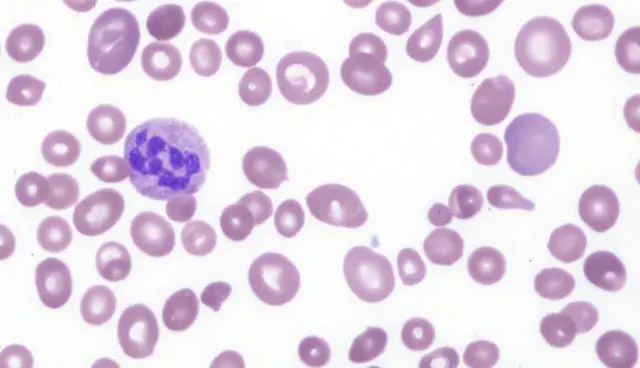
Vitamin B12 and folic acid deficiency: what is the danger
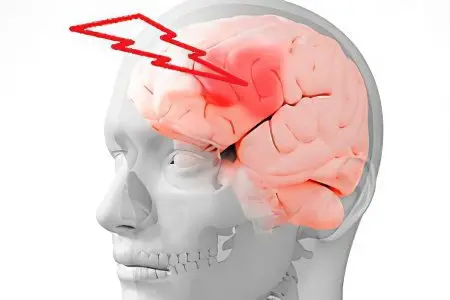
B12-deficiency anemia and its variety, accompanied by a lack of folic acid in the body, are megaloblastic anemias, which lead to a disruption in the production of DNA responsible for cell proliferation. With anemia, cells of the bone marrow, skin, and mucous membranes of the gastrointestinal tract suffer more than others.
The “affected” cells are hematopoietic cells. They are also called hematopoietic cells. If this process is disturbed, then the patient develops anemia. Often, in addition to anemia, which is accompanied by a drop in the level of red blood cells and hemoglobin in the blood, people develop a shortage of other blood cells: platelets, neutrophils, monocytes, reticulocytes.
All violations of the hematopoietic system have a close relationship with each other. The explanation for this is as follows:
In order for the body to form active folic acid, vitamin B12 is needed.
In turn, folic acid is needed for the production of thymidine – this is an important component of DNA. If there is not enough vitamin B12 in the body, then the synthesis of thymidine stops, which leads to the formation of defective DNA. It quickly collapses, and the cells of tissues and organs die.
If at least one of the links in this chain is broken, then blood cells and cells of the digestive tract will not be able to form normally.
Vitamin B12 is responsible for the breakdown and production of certain fatty acids. If it is deficient in the body, then this leads to the accumulation of methylmalonic acid, which is detrimental to neutrons. Its excess reduces the production of myelin, which is part of the myelin sheath that covers nerve fibers and is responsible for transmitting impulses through nerve cells.
Folic acid does not affect the breakdown of fatty acids, it is not required to ensure the normal functioning of the nervous system. If a person suffering from vitamin B12 deficiency is prescribed folic acid, then for some time it will stimulate the production of red blood cells, but when it accumulates in the body in too much, this effect will end. Excess folic acid will stimulate vitamin B12 to start the process of erythropoiesis. Moreover, even that vitamin B12, which is intended for the breakdown of fatty acids, will be forced to work. Naturally, this will negatively affect the nerve fibers, the spinal cord (the processes of its degeneration will be launched), the functional sensitivity and motor function of the spinal cord will be disturbed, and combined sclerosis may develop.
So, a low level of vitamin B12 in the body entails a violation of the growth of blood cells and provokes the occurrence of anemia. Also, vitamin B12 deficiency negatively affects the functioning of the nervous system. Folic acid negatively affects the process of division of hemocytoblasts, but the human nervous system does not suffer.
What is the mechanism of development of B12 deficiency anemia?
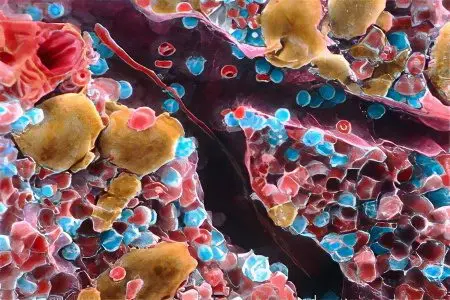
In order for vitamin B12 to be absorbed from food by the organs of the digestive system, it is necessary that it be “helped” by the internal factor of Castle, which is a special enzyme. This enzyme is produced by the lining of the stomach.
The process of absorption of vitamin B12 in the body occurs as follows:
Once in the stomach, vitamin B12 finds protein-R, combines with it and in such a bundle enters the duodenum. There, the vitamin will be affected by enzymes that break it down.
In the duodenum, vitamin B12 detaches protein-R from itself and in the free state meets the intrinsic factor of Castle, forming a new complex.
This new complex travels to the small intestine, searches for receptors that respond to intrinsic factor, binds to it, and is absorbed into the bloodstream.
Once in the blood, vitamin B12 is attached to the transport protein (transcobalamin I and II) and sent to the organs that need it, or to the depot. The place of reserve is the liver and bone marrow.
If vitamin B12 does not combine with intrinsic factor in the duodenum, it will simply be brought out. Deficiency of the intrinsic factor will lead to the fact that 1% of vitamin B12 enters the bloodstream, and the rest of it simply disappears without benefiting the person.
Normally, a healthy person should receive 3-5 micrograms of vitamin B12. It should be at least 4 g in the reserve reserves of the body. Therefore, provided that vitamin B12 does not enter the body, or ceases to be absorbed by it, its acute deficiency will develop only after 4-6 years.
Folic acid reserves are designed for a shorter period, this vitamin will be completely removed from the body after 3-4 months. Therefore, if a woman has not previously suffered from a vitamin B12 deficiency, then during pregnancy, even with a lack of it, she is not at risk of anemia. While the level of folic acid can decrease significantly, especially if there were no reserves in the body, and the woman eats few raw vegetables and fruits. The development of folic acid deficiency anemia in this case is quite likely.
The source of vitamin B12 is animal products, and the body can “get” folic acid for itself from almost any food. However, vitamin B12 tolerates heat well, while folic acid is rapidly destroyed. It is enough to boil the product for 15 years so that vitamin B9 completely disappears from it.
Causes of vitamin B12 and folic acid deficiency

Vitamin B12 deficiency in the body can be caused by the following reasons:
Insufficient intake of vitamin B12 from food. Due to various circumstances, a person may not eat meat, liver, eggs, dairy products. Vitamin B12 deficiency is often observed in people who eat exclusively plant foods. As a rule, with a balanced diet in a healthy person, anemia with a lack of vitamin B12 does not develop. Learn more about vitamin B12 record-breaking foods
Chronic alcoholism can provoke B12 deficiency anemia. Taking large doses of alcoholic beverages does not allow vitamin B12 to interact with the intrinsic factor of Castle. In addition, alcoholics often have diseases of the digestive system, which also prevents the absorption of vitamin B12 into the blood. Cirrhosis and hepatitis, which develop against the background of alcohol dependence, lead to a decrease in cobalamin reserves in the liver.
Failures in the development of internal factor Cala. Its insufficient secretion may be due to atrophic changes in the intestinal mucosa, genetic abnormalities, exposure to toxic substances, autoimmune pathologies. All these reasons in one way or another affect the integrity of the intestinal mucosa, causing its atrophy.
People who have undergone surgery to completely remove the stomach are at risk of developing B12-deficiency anemia. However, if the resection was partial, then such a violation does not develop.
The absence of receptors that are needed to bind internal factors. A similar situation can happen with Crohn’s disease, which affects the entire intestine, with cancerous neoplasms of the intestine and with the formation of diverticula in it. Dangerous in this regard is intestinal tuberculosis, celiac disease, chronic enteritis, resection of the ileum.
Sometimes vitamin B12 can be consumed by parasites that live in the human intestine. As a result, the owner of helminths will get only a small part of it.
Disorders in the work of the pancreas. This leads to the fact that protein-R will not be fully broken down, which means that vitamin B12 will not be able to bind with intrinsic factor.
A hereditary disease that leads to a decrease in the level of transcobalamin prevents the normal transport of vitamin B12 to the bone marrow. Fortunately, this pathology is extremely rare. Also, diseases that can lead to the development of anemia include Imerslund-Gresbeck syndrome (absorption of vitamin B12 in the intestine is impaired) and a violation of the use of vitamin B12 in cells.
Folic acid, as mentioned above, is present in almost all foods. It is quickly absorbed in the intestines (provided that the person is healthy), for which she does not need an internal factor.
Folic acid deficiency can occur in the following cases:
The human menu is extremely limited.
A person suffers from anorexia and independently refuses to eat.
The man has entered old age.
A person suffers from alcoholism with the formation of an abstinence syndrome.
A person suffers from diseases of the digestive system: Crohn’s disease, cancer, celiac disease, etc.
A person is at that period of his life when his need for folic acid increases. For example, this applies to pregnant women.
Patients with alcoholism, psoriasis, dermatitis need an increased intake of folic acid.
Taking certain medications, such as anticonvulsants, can lead to a lack of folic acid. This must be taken into account when choosing therapy.
Symptoms of B12 deficiency anemia and lack of folic acid in the body

The following symptoms indicate B12 deficiency anemia:
Increased fatigue.
Deterioration in performance.
Rapidly occurring weakness that develops even against the background of minimal physical activity. If physical activity was significant, then this can provoke fainting.
Low blood pressure.
Headaches and dizziness that occurs with a certain frequency.
Cardiac arrhythmias with its amplification. When the body suffers from hypoxia, it activates protective reactions. One of them is an increase in the load on the heart. The more often it beats, the more oxygen the organs receive.
Heart pains develop due to the fact that the body works at an accelerated pace.
Paleness of the skin, which gives some yellowness. Hemoglobin, which is part of red blood cells, is responsible for giving the skin a pink color. With anemia, the skin does not become pale overnight. She fades gradually over several months. In the spleen and bone marrow at this time, the destruction of red blood cells continues, which entails the release of a large amount of bilirubin into the blood. Therefore, the skin acquires a yellowish tint.
Symptoms of inflammation of the tongue, atrophy of its papillae. The surface of the tongue becomes as if varnished, slightly shiny. A person experiences a feeling of pain and fullness in the tongue.
The liver and spleen may be enlarged, which is noticeable on palpation.
Legs often swell.
“Flies” may flash before the eyes.
Periodically, a person will be haunted by constipation, which is replaced by diarrhea. The patient is often worried about flatulence and heartburn.
A sign of anemia is often a distortion of taste. A person loses taste sensations, while he may develop cravings for foods that he did not like before.
Ulcers form in the mouth, which is explained by a decrease in immunity and the reproduction of pathogenic flora.
Appetite is disturbed, weight begins to decrease.
There may be pain in the abdomen after eating. Most often this occurs against the background of severe gastritis, exacerbation of peptic ulcer. The pain is stronger, the coarser the food eaten.
Vitamin B12 deficiency is always accompanied by damage to the organs of the digestive system, blood and nervous system. With a lack of folic acid, there will be no symptoms from the nervous system.
Therefore, only B12-deficiency anemia is indicated by:
Funicular myelosis, which is accompanied by lesions of the spinal cord.
Peripheral polyneuropathy, which is expressed by muscle weakness, impaired sensitivity and deterioration of tendon reflexes. Sensitivity worsens in all parts of the body. First of all, a person notices that his fingers are becoming less sensitive. If there is no treatment, then this symptom will constantly progress. In the hands and feet, a slight tingling, numbness may periodically occur. Goosebumps often crawl over the skin.
Depression, memory problems, mental disorders. In severe cases, patients experience hallucinations, convulsions, psychosis.
The movements of the patient become uncoordinated, clumsy.
Muscle strength weakens.
If B12-folate deficiency anemia has already begun to develop, then it will progress slowly. Signs of pathology are poorly expressed. Until recently, these disorders were considered diseases of the elderly. However, statistical analysis indicates that anemia has become much younger. Vitamin B12 and B9 deficiency is increasingly diagnosed in young people.
How to detect a violation?

The doctor, during the examination, should pay attention to the yellowing of the sclera of the eyes, to a slight yellowish tint of the skin. If such signs are found, the patient should be immediately referred for laboratory tests.
To begin with, the patient must pass the following tests:
General blood analysis. This will reduce the level of red blood cells, hemoglobin, platelets, neutrophils. The color index of blood exceeds one. In addition, macrocytosis, anisocytosis, poikilocytosis are observed. In erythrocytes, Jolly bodies and Cabot rings can be found.
The level of bilirubin rises. To identify this, it is necessary to donate blood for a biochemical analysis.
If the laboratory results correspond to the described indicators, then the patient must be sent for a spinal cord puncture. The fact is that a similar picture can be observed not only with B12-deficiency anemia, but also against the background of leukemia, hemolytic, hypoplastic and aplastic anemia. If huge megacarcytes and granulocytes are found in the bone marrow, then this is a sign that allows you to confirm B12-deficiency anemia.
It is imperative to determine whether a person has only B12-deficiency anemia, or it is accompanied by folate deficiency anemia. Therefore, the doctor must carefully approach the study of the patient’s medical history, find out whether close blood relatives suffered from similar disorders. It will not be possible to do without laboratory research. It should be noted that the doctor faces certain difficulties. It is very difficult to calculate with high accuracy the amount of certain vitamins in the blood. Microbiological studies provide only indicative values. Information can be given by radioimmunological methods, but they are not available to all categories of citizens. So, in small towns, such a diagnosis is very difficult.
Therefore, to make a diagnosis, the patient is recommended to pass urine for analysis to determine the level of methylmalonic acid in it. Against the background of B12-deficiency anemia, the level of this acid in urine will be increased, and with folate deficiency anemia, its values remain within the normal range.
It is equally important to establish the causes of B12 deficiency anemia. For this, the following methods can be used: ultrasound of the liver and other internal organs, determination of the level of thyroid hormones, analysis of feces for helminthiasis, determination of antibodies to the internal factor of Castle. A procedure such as EGD is aimed at examining the mucous membrane of the stomach and intestines. It allows you to detect atrophic changes on the inner surface of these organs.
How to treat?

If a patient has a lack of folic acid, then he is prescribed this drug in the form of tablets. The average daily dose varies between 5-15 mg. If the doctor is not sure that the patient has a folic acid deficiency, then therapy should begin with taking vitamin B12. It is administered intramuscularly. It is impossible to do the opposite, since, provided that the patient has a lack of vitamin B12, the use of folic acid will only harm health.
Principles of treatment of anemia with vitamin B12 deficiency:
Elimination of deficiency and replenishment of cyanocobalamin reserves.
Prophylactic vitamin B12 intake.
Monitoring the patient’s condition during the treatment and after its completion.
Therapy for B12 deficiency anemia is built as follows:
Intramuscular administration of cyanocobalamin at a dosage of 500 mcg per day. Intramuscular administration of oxycobalamin at a dosage of 1000 mcg every other day.
With the development of funicular myelosis, the dose is increased to 1000 mcg for vitamin B12. It is also required to supplement the treatment with 500 mcg of adenosylcobalamin. The drug is prescribed in tablet form.
Iron preparations are prescribed if there is a deficiency of this trace element.
Severe anemia requires a red blood cell transfusion. It is indicated for such disorders as: severe cerebral hypoxia, anemic encephalopathy, heart failure, anemic coma.
Be sure to direct efforts to eliminate the causes that provoked the development of anemia. It is possible that the patient will need antiparasitic treatment, treatment of diseases of the digestive system. The operation is performed when cancerous neoplasms are detected.
Separately, a diet plan is developed for the patient, which will make it possible to compensate for the deficiency of vitamin B12 in the body.
After 3-4 days from the start of therapy, a re-count of the number of reticulocytes is required. If there is a reticulocyte crisis, then the treatment regimen can be considered effective.
When it is possible to normalize blood counts, the patient is transferred to maintenance therapy. First, every week he is given 500 micrograms of vitamin B12, then the same dosage of the vitamin is administered every 30 days. Once every 6 months, the patient is recommended a course of vitamin B12 for a period of 14-21 days.
Dietary food
An adult should receive 3-5 micrograms of vitamin B12 per day. Therefore, proper nutrition is of great importance for the treatment and prevention of anemia. Products that must be included in the diet: beef, pork and chicken liver, mackerel, rabbit, meat (pork and beef), cod, carp, chicken eggs, sour cream.
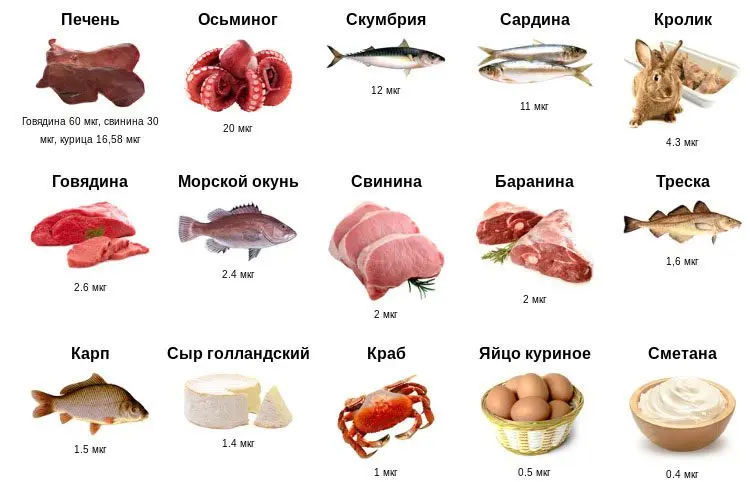
Forecast
If you ignore the treatment of B12-deficiency anemia, then this threatens with serious health problems. All organs and systems will suffer (brain, heart, digestive, hematopoietic system, etc.). The earlier therapy is started, the better the prognosis. Most often, vitamin B12 deficiency is easily eliminated with the help of medical correction.
The introduction of intramuscular injections of cyanocobalamin into practice has improved the prognosis for recovery. If you follow the diet and medical recommendations regarding taking the drug for preventive purposes, then you can never know about the symptoms of B12-deficiency anemia.
An unfavorable prognosis will be when treatment starts too late, with severe anemia, with the development of symptoms from the nervous system. It is also not always possible to cope with the complications of anemia caused by genetic disorders.
Video: about vitamin B12 deficiency, the Living Healthy program:









